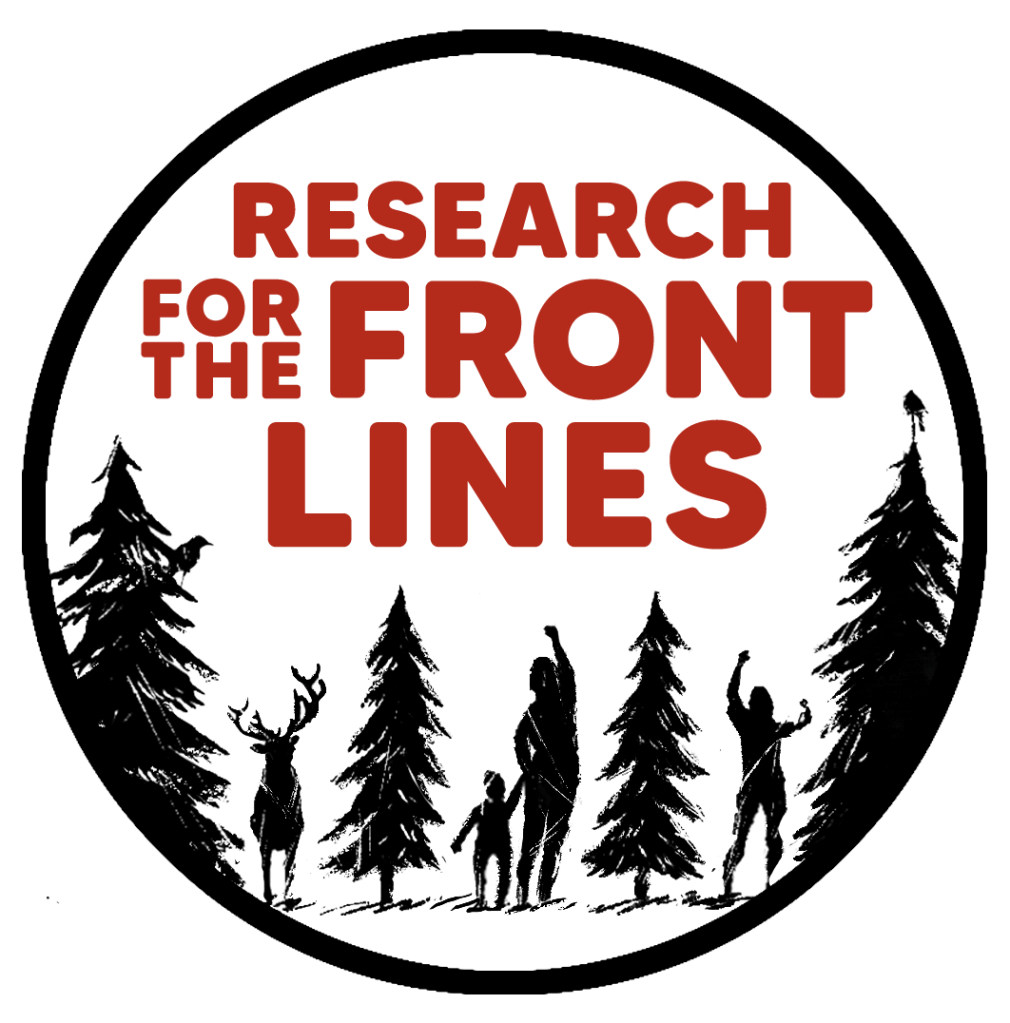
What we offer: Research for the Front Lines (R4FL) provides pro bono research services in support of communities and movements fighting for environmental justice. We connect grassroots folks on the front lines of the fight for social, environmental, and climate justice in Canada with researchers who have skills, time, and labor to offer. If strategic research—data gathering, analysis, report writing, or other such tasks—could be helpful to your fight, please get in touch. We can put together a team of volunteer researchers to (a) work collaboratively with you to design and carry out the research or (b) just do the research you need done and send you the findings. Our research support can involve long-term and in-depth collaboration or it can be short term, with quick turnaround and little required from you other than the initial instructions on what you need done.
Our guiding principles: We are committed to prioritizing the voices and concerns of front-line communities and movements and to rigorous, community-driven research practices that reflect the values and goals of those communities/movements. All R4FL research activities are community/movement-driven, meaning that community members and organizers determine the research process from start to finish. We do not conduct research in or on communities, but with communities and in service to them. Collaboration is key, but ultimately front-line communities decide what types of project relationships, research designs, and methodologies will be used, and what happens with the findings from the research is fully determined by the community/movement partners. We strive to build honest, constructive partnerships to meet community/movement research needs and build lasting trust across movements and struggles.
Who we serve: R4FL supports grassroots movements and front-line communities who face disproportionate environmental harm, either because their lands and bodies are targeted by extractive industry, racism, or other forms of systemic discrimination, or because climate change—itself a result of colonial industry—affects them disproportionately. Front-line communities include Indigenous, racialized, and economically marginalized people. Other groups of people can bear disproportionate environmental burdens too, such as women, LGTBQAI+ people, migrants and refugees, and people from the global South. We support these communities and movements in their fight for environmental and climate justice, ultimately aiming for a world where environmental harms are no longer foisted on already-marginalized peoples and where the lands and waters are stewarded by their original caretakers. We collaborate on research that ultimately challenges extractive, colonial capitalism and promotes just, flourishing alternatives.
How we aim to do research differently: We recognize that research in Indigenous and racialized communities and in movements has often been harmful, colonial, and extractive in nature. The values, goals, ways of knowing, and methods of Western-centered research have often been at odds with those of Indigenous and racialized communities. Research has lacked accountability to the communities “under study” and has inflicted direct physical, social, or spiritual harm through non-consensual or manipulative research practices, the reinforcement of racist stereotypes, or the appropriation of linguistic, artistic, or physical material. We seek to invert this paradigm by prioritizing front-line community/movement voices and ways of knowing, and by following their lead in determining the research needs and methods for all our projects.
Who are the “experts?” In all our work, community members and movement organizers determine the project objectives, relationships, protocols, and timelines. R4FL supports these communities and organizers by offering a wide range of research services and coordinating a large pool of volunteer researchers with skills in both qualitative and quantitative methods. We also affirm the validity of community-based and non-Western ways of knowing and understanding the world. Both community members and volunteer researchers can be practiced experts in various methods of inquiry, such as Traditional Ecological Knowledge, data analysis, oral history, and archival research. Methods are based on the needs of the community and the individual project, and we strive to openly share and exchange knowledge in the interests of transparency and improving research results.
Examples of recent and ongoing projects: A report on police violence at the Fairy Creek Blockade submitted to the Office of the UN High Commissioner for Human Rights; a moose population study with the Anishnabe Moose Committee; an environmental justice mapping project covering all of Canada; and an in-depth investigative article on a British Columbia RCMP detachment that targets Indigenous land defenders and environmental protesters.
For more information about Research for the Front Lines, email us at researchforthefrontlines@gmail.com, visit our webpage or our Facebook page, or follow us on Twitter: @RsrchFrontLines. Instagram #research4thefrontlines
Are you a member of a community facing climate impacts and/or unwanted resource development?
Are you a land defender, activist, or grassroots community organizer fighting for climate and environmental justice?
Could strategic research, data gathering, and writing be useful to your struggle?
If so, get in touch with us at: researchforthefrontlines@gmail.com
